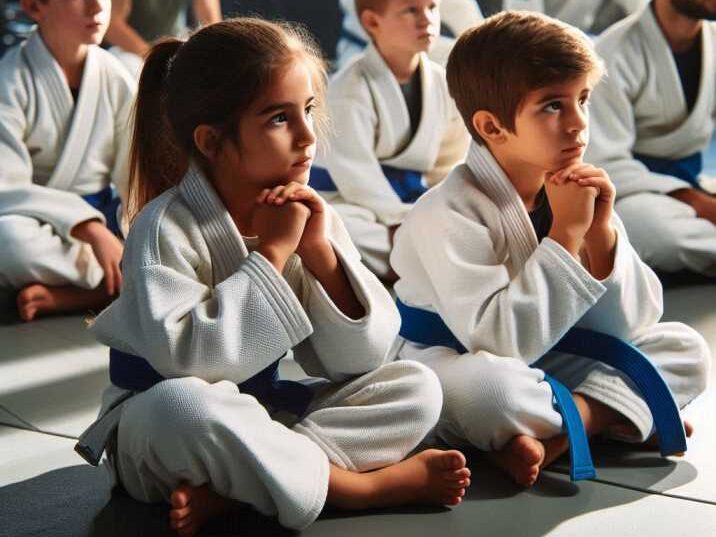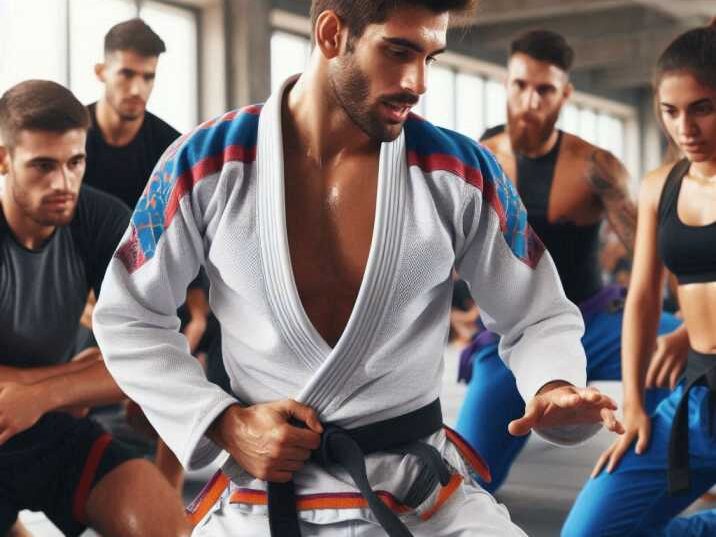Introduction
Table of Contents
Brazilian Jiu-Jitsu (BJJ) is a martial art known for its ground-fighting techniques and unique strategies. It’s highly effective for self-defense, helping people of all sizes defend themselves through smart techniques and leverage rather than pure strength. BJJ teaches students to gain control over a situation calmly and confidently, making it popular for both self-defense and as a challenging physical workout.
In this article, we’ll explore the fundamentals of Brazilian Jiu-Jitsu for self-defense , how it benefits, and why learning this art form also boosts discipline, confidence, and mental focus.

What is Brazilian Jiu-Jitsu (BJJ)?
Brazilian Jiu-Jitsu is a martial art developed from Japanese Jiu-Jitsu and Judo techniques. It emphasizes grappling and ground-fighting, allowing people to control an opponent effectively using leverage and technique. BJJ was designed to give smaller people a fighting chance against stronger opponents, which makes it perfect for self-defense.
Why is Brazilian Jiu-Jitsu Effective for Self-Defense?
1. It Emphasizes Technique Over Strength
In BJJ, strength alone won’t secure a win. Instead, students learn to use leverage and body positioning, making it possible for smaller individuals to control and submit to larger opponents. This aspect is critical for self-defense, as it allows people to handle threats even if they are not physically strong.
2. Close Combat Skills
Unlike many martial arts that focus on punches and kicks, BJJ trains people to defend themselves in close-contact situations. The techniques focus on joint locks, chokeholds, and positional control, which are effective in situations where escape might not be possible.
3. It Builds Awareness and Control
BJJ helps build a deep sense of awareness about one’s surroundings and body. Practitioners learn to read opponents’ intentions and move strategically, enabling them to assess situations quickly in real-life self-defense scenarios.
Training Benefits for Mental and Physical Health
Brazilian Jiu-Jitsu (BJJ) offers a wide range of benefits that go beyond self-defense, positively impacting mental and physical well-being. Here’s a closer look at how BJJ training enhances concentration, physical fitness, and mental clarity:
1. Enhanced Concentration and Discipline
BJJ requires students to stay focused on specific movements and techniques, which builds mental concentration. Each technique in BJJ demands attention to detail, precise timing, and controlled breathing. This focus on the present moment helps develop better concentration skills that can translate to other areas, like schoolwork or daily responsibilities. Additionally, the discipline required to attend classes, learn techniques, and improve over time strengthens perseverance and time management. Students often find that as their discipline in BJJ grows, their focus and productivity improve in other aspects of their lives as well.
2. Improved Physical Fitness
Consistent training in BJJ involves using nearly every part of the body, making it a complete workout. Students build cardiovascular endurance through repeated movements and sparring sessions, which improve heart health and stamina. BJJ also develops muscular strength—especially in the core, legs, and upper body—as students learn to apply techniques and hold positions. Flexibility is another key benefit, as BJJ involves many positions that stretch and strengthen muscles and joints. Over time, this leads to a healthier, stronger, and more resilient body, making BJJ an excellent choice for overall fitness.
3. Stress Relief and Mental Clarity
The focus and discipline required in BJJ serve as a form of mental relaxation. During training, practitioners must concentrate entirely on their movements, leaving little room for outside worries. This immersion provides an effective form of stress relief, helping clear the mind and reduce anxiety. BJJ training also releases endorphins, the body’s natural “feel-good” chemicals, which contribute to a more positive mood. Many practitioners report feeling a sense of calm and mental clarity after training, as BJJ offers a physical outlet for stress while also providing mental relaxation. This can improve overall mental health, promoting a balanced and calm mindset even outside of training.
Key Techniques in Brazilian Jiu-Jitsu for Self-Defense
1. Guard Position
The guard position is a foundational defensive stance in BJJ that allows a practitioner to protect themselves even when they’re on the ground. In this position, a person can control their opponent’s movements by using their legs and arms to keep the attacker at bay. This control provides time to plan the next move, whether it’s a sweep to reverse positions or setting up a submission.

2. Chokeholds
Chokeholds are powerful techniques in BJJ that enable practitioners to safely and effectively subdue an opponent. By applying pressure to the opponent’s neck, chokeholds like the rear-naked choke and the guillotine can force them to submit without causing serious harm. These techniques can be invaluable in a self-defense situation, as they allow the practitioner to neutralize a threat quickly.
3. Joint Locks
Joint locks focus on controlling an opponent by isolating and applying pressure to their joints, often targeting the arms or shoulders. Techniques such as the armbar and kimura create leverage against the opponent’s joints, limiting their movement and ability to resist. Joint locks are especially useful in self-defense because they can end a confrontation quickly, allowing the practitioner to escape or gain control.
How to Get Started in Brazilian Jiu-Jitsu
1. Choose the Right School
Finding the right BJJ school is essential for quality training. Look for a school that emphasizes both self-defense and sports aspects, as this provides a balanced approach. A school with experienced instructors and a supportive environment is key to learning effectively.
2. Get Comfortable with Rolling
“Rolling” is the term used for sparring in BJJ, where students practice techniques with each other in a controlled setting. This real-time practice builds confidence, helps students understand techniques better, and prepares them for self-defense scenarios by simulating a live interaction.
3. Focus on Basics First
Starting with the basics is essential in BJJ. Practicing foundational techniques, such as the guard position, escapes, and basic submissions, builds a strong base and prepares students for more complex moves. Learning these essential techniques helps students feel confident and safe as they progress in their training.
Table of Information
| Aspect | Details |
|---|---|
| Primary Focus | Grappling and ground-fighting techniques |
| Best For | Self-defense, physical fitness, discipline, focus |
| Skill Development | Problem-solving, agility, strength, mental resilience |
| Suitable For | People of all ages and sizes |
| Unique Techniques | Leverage-based techniques, joint locks, chokes |
Conclusion
Brazilian Jiu-Jitsu (BJJ) offers much more than just self-defence skills. It builds confidence, discipline, and mental focus, which are valuable in many aspects of life, from school to social situations. By focusing on technique and strategy, BJJ allows people of all sizes to feel empowered and prepared to protect themselves if needed. Additionally, the physical and mental benefits, such as improved fitness, reduced stress, and increased concentration, make it an excellent choice for anyone seeking a well-rounded martial art.
Learning Brazilian Jiu-Jitsu is a journey that helps individuals grow, stay focused, and become more resilient. For those who want to build strength, both mentally and physically, and develop practical self-defence skills, BJJ is a rewarding and transformative choice.
FAQs
1. Is Brazilian Jiu-Jitsu good for beginners?
Yes, Brazilian Jiu-Jitsu is excellent for beginners, as it focuses on technique over strength.
2. Can kids learn Brazilian Jiu-Jitsu?
Absolutely! BJJ is safe and fun for kids, helping them build confidence, discipline, and focus.
3. What’s the difference between Brazilian Jiu-Jitsu and traditional Jiu-Jitsu?
Brazilian Jiu-Jitsu focuses on ground fighting and submissions, while traditional Jiu-Jitsu includes more strikes and standing techniques.
4. Do you need to be strong to do BJJ?
No, BJJ emphasizes technique and leverage, so strength isn’t necessary for success.
5. Is BJJ effective for self-defense?
Yes, BJJ is highly effective for self-defense, especially in close-contact situations.


